- Home
- H. Beam Piper
Murder in the Gunroom Page 2
Murder in the Gunroom Read online
Page 2
CHAPTER 2
After ushering his client out the hall door and closing it behind her,Rand turned and said:
"All right, Kathie, or Dave; whoever's out there. Come on in."
Then he went to his desk and reached under it, snapping off a switch.As he straightened, the door from the reception-office opened andhis secretary, Kathie O'Grady, entered, loading a cigarette into aneight-inch amber holder. She was a handsome woman, built on the generouslines of a Renaissance goddess; none of the Renaissance masters, however,had ever employed a model so strikingly Hibernian. She had blue eyes, anda fair, highly-colored complexion; she wore green, which went well withher flaming red hair, and a good deal of gold costume-jewelry.
Behind her came Dave Ritter. He was Rand's assistant, and also Kathie'slover. He was five or six years older than his employer, and slightlybuilt. His hair, fighting a stubborn rearguard action against baldness,was an indeterminate mousy gray-brown. It was one of his professionalassets that nobody ever noticed him, not even in a crowd of one; when hewanted it to, his thin face could assume the weary, baffled expression ofa middle-aged book-keeper with a wife and four children on fifty dollarsa week. Actually, he drew three times that much, had no wife, admitted tono children. During the war, he and Kathie had kept the Tri-State Agencyin something better than a state of suspended animation while Rand hadbeen in the Army.
Ritter fumbled a Camel out of his shirt pocket and made a beeline for thedesk, appropriating Rand's lighter and sharing the flame with Kathie.
"You know, Jeff," he said, "one of the reasons why this agency never madeany money while you were away was that I never had the unadulteratedinsolence to ask the kind of fees you do. I was listening in on theextension in the file-room; I could hear Kathie damn near faint whenyou said five grand."
"Yes; five thousand dollars for appraising a collection they've beenoffered ten for, and she only has a third-interest," Kathie said,retracting herself into the chair lately vacated by Gladys Fleming."If that makes sense, now ..."
"Ah, don't you get it, Kathleen Mavourneen?" Ritter asked. "She doesn'tcare about the pistols; she wants Jeff to find out who fixed up thataccident for Fleming. You heard that big, long shaggy-dog story aboutexactly what happened and where everybody was supposed to have been atthe time. I hope you got all that recorded; it was all told for apurpose."
Rand had picked up the outside phone and was dialing. In a moment, agirl's voice answered.
"Carter Tipton's law-office; good afternoon."
"Hello, Rheba; is Tip available?"
"Oh, hello, Jeff. Just a sec; I'll see." She buzzed another phone. "JeffRand on the line," she announced.
A clear, slightly Harvard-accented male voice took over.
"Hello, Jeff. Now what sort of malfeasance have you committed?"
"Nothing, so far--cross my fingers," Rand replied. "I just want a littleinformation. Are you busy?... Okay, I'll be up directly."
He replaced the phone and turned to his disciples.
"Our client," he said, "wants two jobs done on one fee. Getting thepistol-collection sold is one job. Exploring the whys and wherefores ofthat quote accident unquote is the other. She has a hunch, and probablynothing much better, that there's something sour about the accident. Sheexpects me to find evidence to that effect while I'm at Rosemont, goingover the collection. I'm not excluding other possibilities, but I'll workon that line until and unless I find out differently. Five thousandshould cover both jobs."
"You think that's how it is?" Kathie asked.
"Look, Kathie. I got just as far in Arithmetic, at school, as you did,and I suspect that Mrs. Fleming got at least as far as long division,herself. For reasons I stated, I simply couldn't have handled thatcollection business for anything like a reasonable fee, so I told herfive thousand, thinking that would stop her. When it didn't, I knew shehad something else in mind, and when she went into all that detail aboutthe death of her husband, she as good as told me that was what it was.Now I'm sorry I didn't say ten thousand; I think she'd have bought it atthat price just as cheerfully. She thinks Lane Fleming was murdered.Well, on the face of what she told me, so do I."
"All right, Professor; expound," Ritter said.
"You heard what he was supposed to have shot himself with," Rand began."A Colt-type percussion revolver. You know what they're like. And I knowenough about Lane Fleming to know how much experience he had with oldarms. I can't believe that he'd buy a pistol without carefully examiningit, and I can't believe that he'd bring that thing home and start workingon it without seeing the caps on the nipples and the charges in thechambers, if it had been loaded. And if it had been, he would have firsttaken off the caps, and then taken it apart and drawn the charges. Andshe says he started working on it as soon as he got home--presumablyaround five--and then took time out for dinner, and then went back towork on it, and more than half an hour later, there was a shot and he waskilled." Rand blew a Bronx cheer. "If that accident had been the McCoy,it would have happened in the first five minutes after he started workingon that pistol. No, in the first thirty seconds. And then, when theyfound him, he had the revolver in his right hand, and an oily rag in hisleft. I hope both of you noticed that little touch."
"Yeah. When I clean a gat, I generally have it in my left hand, and cleanwith my right," Ritter said.
"Exactly. And why do you use an oily rag?" Rand inquired.
Ritter looked at him blankly for a half-second, then grinned ruefully.
"Damn, I never thought of that," he admitted. "Okay, he was bumped off,all right."
"But you use oily rags on guns," Kathie objected. "I've seen both of you,often enough."
"When we're all through, honey," Ritter told her.
"Yes. When he brought home that revolver, it was in neglected condition,"Rand said. "Either surface-rusted, or filthy with gummed oil and dirt.Even if Mrs. Fleming hadn't mentioned that point, the length of time hespent cleaning it would justify such an inference. He would have taken itapart, down to the smallest screw, and cleaned everything carefully, andthen put it together again, and then, when he had finished, he would havegone over the surface with an oiled rag, before hanging it on the wall.He would certainly not have surface-oiled it before removing the charges,if there ever were any. I assume the revolver he was found holding,presumably the one with which he was killed, was another one. And I wouldfurther assume that the killer wasn't particularly familiar with thesubject of firearms, antique, care and maintenance of."
"And with all the hollering and whooping and hysterics-throwing, nobodynoticed the switch," Ritter finished. "Wonder what happened to the one hewas really cleaning."
"That I may possibly find out," Rand said. "The general incompetence withwhich this murder was committed gives me plenty of room to hope that itmay still be lying around somewhere."
"Well, have you thought that it might just be suicide?" Kathie asked.
"I have, very briefly; I dismissed the thought, almost at once," Randtold her. "For two reasons. One, that if it had been suicide, Mrs.Fleming wouldn't want it poked into; she'd be more than willing to let itride as an accident. And, two, I doubt if a man who prided himself on hisgun-knowledge, as Fleming did, would want his self-shooting to be takenfor an accident. I'm damn sure I wouldn't want my friends to go aroundsaying: 'What a dope; didn't know it was loaded!' I doubt if he'd evenexpect people to believe that it had been an accident." He shook hishead. "No, the only inference I can draw is that somebody murderedFleming, and then faked evidence intended to indicate an accident." Herose. "I'll be back, in a little; think it over, while I'm gone."
* * * * *
Carter Tipton had his law-office on the floor above the Tri-StateDetective Agency. He handled all Rand's not infrequent legalinvolvements, and Rand did all his investigating and witness-chasing;annually, they compared books to see who owed whom how much. Tipton wasabout five years Rand's junior, and had been in the Navy during the war.He was frequently described as New B
elfast's leading younger attorney andmost eligible bachelor. His dark, conservatively cut clothes fitted himas though they had been sprayed on, he wore gold-rimmed glasses, and hewas so freshly barbered, manicured, valeted and scrubbed as to give theimpression that he had been born in cellophane and just unwrapped. Heleaned back in his chair and waved his visitor to a seat.
"Tip, do you know anything about this Fleming family, out at Rosemont?"Rand began, getting out his pipe and tobacco.
"The Premix-Foods Flemings?" Tipton asked. "Yes, a little. Which one ofthem wants you to frame what on which other one?"
"That'll do for a good, simplified description, to start with," Randcommented. "Why, my client is Mrs. Gladys Fleming. As to what shewants...."
He told the young lawyer about his recent interview and subsequentconclusions.
"So you see," he finished, "she won't commit herself, even with me. Maybeshe thinks I have more official status, and more obligations to thepolice, than I have. Maybe she isn't sure in her own mind, and wants meto see, independently, if there's any smell of something dead in thewoodpile. Or, she may think that having a private detective called in maythrow a scare into somebody. Or maybe she thinks somebody may be fixingup an accident for her, next, and she wants a pistol-totin' gent in thehouse for a while. Or any combination thereof. Personally, I deplorethese clients who hire you to do one thing and expect you to do another,but with five grand for sweetening, I can take them."
"Yes. You know, I've heard rumors of suicide, but this is the first whiffof murder I've caught." He hesitated slightly. "I must say, I'm notgreatly surprised. Lane Fleming's death was very convenient to a numberof people. You know about this Premix Company, don't you?"
"Vaguely. They manufacture ready-mixed pancake flour, and ready-mixedice-cream and pudding powders, and this dehydrated vegetable soup--pouron hot water, stir, and serve--don't they? My colored boy, Buck, got someof the soup, once, for an experiment. We unanimously voted not to try itagain."
"They put out quite a line of such godsends to the neophyte in thekitchen, the popularity of which is reflected in a steadily risingdivorce-rate," Tipton said. "They advertise very extensively, includinghalf an hour of tear-jerking drama on a national hookup during soap-operatime. Your client, the former Gladys Farrand, was on the air for Premixfor a couple of years; that's how Lane Fleming first met her."
"So you think some irate and dyspeptic husband went to the source of hiswoes?" Rand inquired.
"Well, not exactly. You see, Premix is only Little Business, as the foodsindustry goes, but they have something very sweet. So sweet, in fact,that one of the really big fellows, National Milling & Packaging, hasbeen going to rather extreme lengths to effect a merger. Mill-Pack, par100, is quoted at around 145, and Premix, par 50, is at 75 now, andMill-Pack is offering a two-for-one-share exchange, which would be alittle less than four-for-one in value. I might add, for what it's worth,that this Stephen Gresham you mentioned is Mill-Pack's attorney,negotiator, and general Mr. Fixit; he has been trying to put overthis merger for Mill-Pack."
"I'll bear that in mind, too," Rand said.
"Naturally, all this is not being shouted from the housetops," Tiptoncontinued. "Fact is, it's a minor infraction of ethics for me to mentionit to you."
"I'll file it in the burn-box," Rand promised. "What was the matter;didn't Premix want to merge?"
"Lane Fleming didn't. And since he held fifty-two per cent of the commonstock himself, try and do anything about it."
"Anything short of retiring Fleming to the graveyard, that is," Randamended. "That would do for a murder-motive, very nicely.... What wereFleming's objections to the merger?"
"Mainly sentimental. Premix was his baby, or, at least, his kid brother.His father started mixing pancake flour back before the First World War,and Lane Fleming peddled it off a spring wagon. They worked up a nicelittle local trade, and finally a state-wide wholesale business. Theyincorporated in the early twenties, and then, after the old man died,Lane Fleming hired an advertising agency to promote his products, andbuilt up a national distribution, and took on some sidelines. Then,during the late Mr. Chamberlain's 'Peace in our time,' he picked up arefugee Czech chemist and foods-expert named Anton Varcek, who whippedup a lot of new products. So business got better and better, and theymade more money to spend on advertising to get more money to buy moreadvertising to make more money, like Bill Nye's Puritans digging clamsin the winter to get strength to hoe corn in the summer to get strengthto dig clams in the winter.
"So Premix became a sort of symbol of achievement to Fleming. Then, hewas one of these old-model paternalistic employers, and he was afraidthat if he relinquished control, a lot of his old retainers would beturned out to grass. And finally, he was opposed in principle toconcentration of business ownership. He claimed it made business morevulnerable to government control and eventual socialization."
"I'm not sure he didn't have something there," Rand considered. "We getall our corporate eggs in a few baskets, and they're that much easier forthe planned-economy boys to grab.... Just who, on the Premix side, was infavor of this merger?"
"Just about everybody but Fleming," Tipton replied. "His two sons-in-law,Fred Dunmore and Varcek, who are first and second vice presidents.Humphrey Goode, the company attorney, who doubles as board chairman.All the directors. All the New York banking crowd who are interestedin Premix. And all the two-share tinymites. I don't know who inheritsFleming's voting interest, but I can find out for you by this timetomorrow."
"Do that, Tip, and bill me for what you think finding out is worth," Randsaid. "It'll be a novel reversal of order for you to be billing me for aninvestigation.... Now, how about the family, as distinct from thecompany?"
"Well, there's your client, Gladys Fleming. She married Lane Flemingabout ten years ago, when she was twenty-five and he was fifty-five. Inspite of the age difference, I understand it was a fairly happy marriage.Then, there are two daughters by a previous marriage, Nelda Dunmore andGeraldine Varcek, and their respective husbands. They all live together,in a big house at Rosemont. In the company, Dunmore is Sales, and Varcekis Production. They each have a corner of the mantle of Lane Fleming inone hand and a dirk in the other. Nelda and Geraldine hate each otherlike Greeks and Trojans. Nelda is the nymphomaniac sister, and Geraldineis the dipsomaniac. From time to time, temporary alliances get formed,mainly against Gladys; all of them resent the way she married herselfinto a third-interest in the estate. You're going to have yourself anice, pleasant little stay in the country."
"I'm looking forward to it." Rand grimaced. "You mentioned suiciderumors. Such as, and who's been spreading them?"
"Oh, they are the usual bodyless voices that float about," Tipton toldhim. "Emanating, I suspect, from sources interested in shaking out theless sophisticated small shareholders before the merger. The story isalways approximately the same: That Lane Fleming saw his company driftingreefward, was unwilling to survive the shipwreck, and performed_seppuku_. The family are supposed to have faked up the accidentafterward. I dismiss the whole thing as a rather less than subtle bit ofmarket-manipulation chicanery."
"Or a smoke screen, to cover the defects in camouflaging a murder as anaccident," Rand added.
Tipton nodded. "That could be so, too," he agreed. "Say somebody dislikesthe looks of that accident, and starts investigating. Then he runs intoall this miasma of suicide rumors, and promptly shrugs the whole thingoff. Fleming killed himself, and the family made a few alterations andare passing it off as an accident. The families of suicides have beenknown to do that."
"Yes. Regular defense-in-depth system; if the accident line ispenetrated, the suicide line is back of it," Rand said. "Well, in thelast few years, we've seen defenses in depth penetrated with monotonousregularity. I've jeeped through a couple, myself, to interrogate thesurviving ex-defenders. It's all in having the guns and armor to smashthrough with."

 The Edge of the Knife
The Edge of the Knife Genesis
Genesis A Slave is a Slave
A Slave is a Slave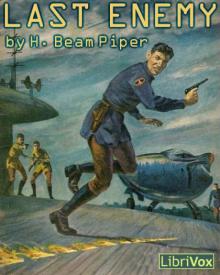 Last Enemy
Last Enemy Uller Uprising
Uller Uprising Ministry of Disturbance
Ministry of Disturbance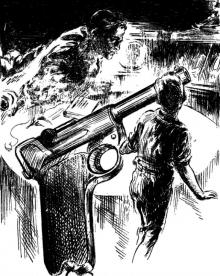 Time and Time Again
Time and Time Again The Mercenaries
The Mercenaries Police Operation
Police Operation He Walked Around the Horses
He Walked Around the Horses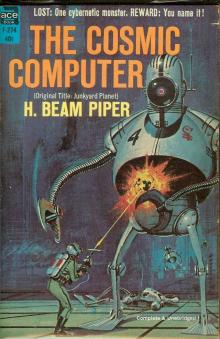 Time Crime
Time Crime Dearest
Dearest Day of the Moron
Day of the Moron Crossroads of Destiny
Crossroads of Destiny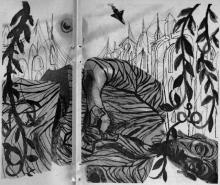 Graveyard of Dreams
Graveyard of Dreams The Cosmic Computer
The Cosmic Computer Ullr Uprising
Ullr Uprising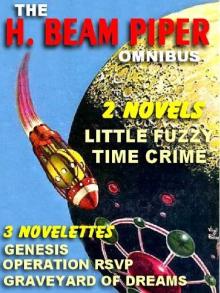 Operation R.S.V.P.
Operation R.S.V.P.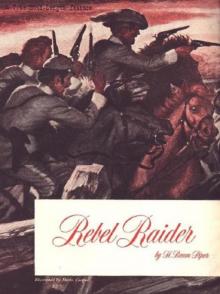 Rebel Raider
Rebel Raider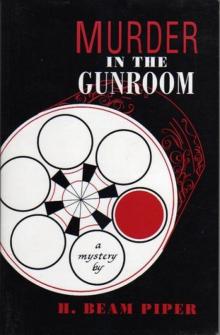 Murder in the Gunroom
Murder in the Gunroom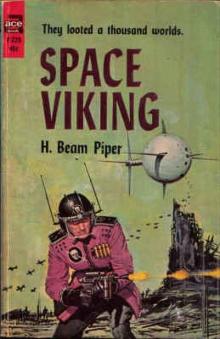 Space Viking
Space Viking The Answer
The Answer A Planet for Texans (aka Lone Star Planet)
A Planet for Texans (aka Lone Star Planet) Little Fuzzy
Little Fuzzy Four-Day Planet
Four-Day Planet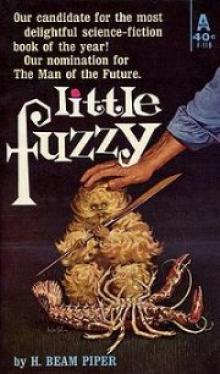 Little Fuzzy f-1
Little Fuzzy f-1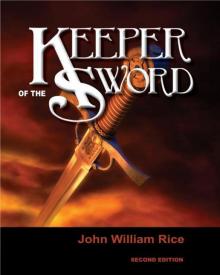 Keeper
Keeper The H. Beam Piper Megapack
The H. Beam Piper Megapack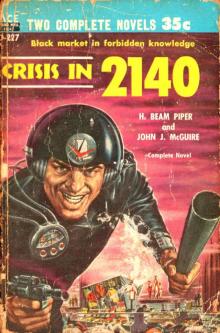 H. Beam Piper
H. Beam Piper Lord Kalvan of Otherwhen
Lord Kalvan of Otherwhen Fuzzy Sapiens f-2
Fuzzy Sapiens f-2 Fuzzies and Other People f-3
Fuzzies and Other People f-3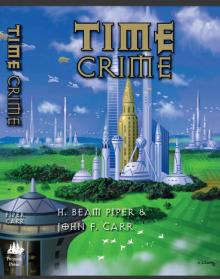 TIME PRIME
TIME PRIME Fuzzy Sapiens
Fuzzy Sapiens Lord Kalvan of Otherwhen k-1
Lord Kalvan of Otherwhen k-1 The Second H. Beam Piper Omnibus
The Second H. Beam Piper Omnibus